Toyota RAV4 (XA50) 2019-2025 Owners Manual: If your vehicle needs to be towed
If towing is necessary, we recommend having your vehicle towed by your Toyota dealer or commercial towing service, using a wheel-lift type truck or flatbed truck.
Use a safety chain system for all towing, and abide by all state/provincial and local laws.
Situations when it is necessary to contact dealers before towing (vehicles with towing eyelet)
The following may indicate a problem with your transmission.
Contact your Toyota dealer or commercial towing service before towing.
- The engine is running but the vehicle does not move.
- The vehicle makes an abnormal sound.
Towing with a wheel-lift type truck
From the front (2WD models)
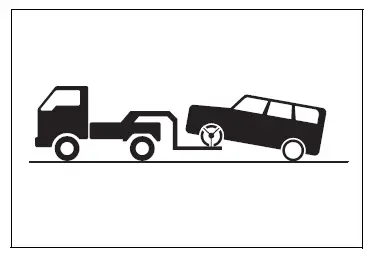
Release the parking brake.
Turn automatic mode off.
From the front (AWD models)
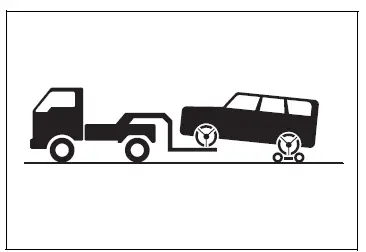
Use a towing dolly under the rear wheels.
From the rear
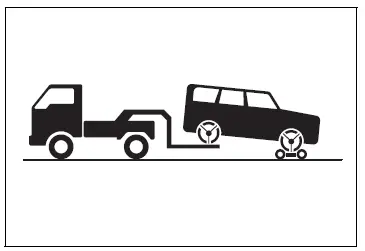
Use a towing dolly under the front wheels.
WARNING
Observe the following precautions.
Failure to do so may result in death or serious injury.
â– When towing the vehicle
2WD models
Be sure to transport the vehicle with the front wheels raised or with all four wheels raised off the ground. If the vehicle is towed with the front wheels contacting the ground, the drivetrain and related parts may be damaged.
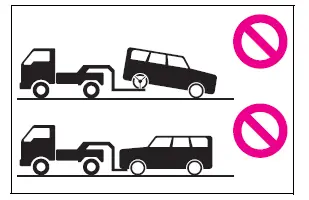
AWD models
Be sure to transport the vehicle with all four wheels raised off the ground. If the vehicle is towed with the tires contacting the ground, the drivetrain or related parts may be damaged, the vehicle may fly off the truck.
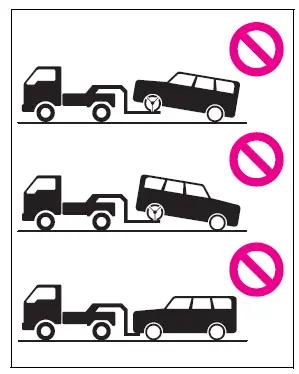
NOTICE
â– To prevent damage to the vehicle when towing using a wheel-lift type truck
- Vehicles without smart key system: Do not tow the vehicle from the rear when the engine switch is in the "LOCK" position or the key is removed. The steering lock mechanism is not strong enough to hold the front wheels straight.
- When raising the vehicle, ensure adequate ground clearance for towing at the opposite end of the raised vehicle. Without adequate clearance, the vehicle could be damaged while being towed.
â– Towing with a sling-type truck
Do not tow with a sling-type truck to prevent body damage.
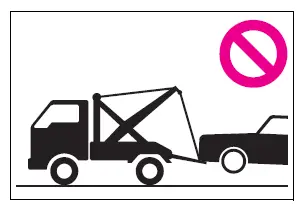
Using a flatbed truck
When using a flat-bed truck to transport the vehicle, use tire strapping belts. Refer to the owner's manual of the flat-bed truck for the tire strapping method.
In order to suppress vehicle movement during transportation, set the parking brake and turn the engine switch to off.
Emergency towing (vehicles with towing eyelet)
If a tow truck is not available in an emergency, your vehicle may be temporarily towed using cables or chains secured to the emergency towing eyelets. This should only be attempted on hard surfaced roads for at most 50 miles (80 km) at under 18 mph (30 km/h).
A driver must be in the vehicle to steer and operate the brakes.
The vehicle's wheels, drive train, axles, steering and brakes must be in good condition.
Emergency towing procedure (vehicles with towing eyelet)
To have your vehicle towed by another vehicle, the towing eyelet must be installed to your vehicle. Install the towing eyelet using the following procedure.
1. Take out the wheel nut wrench and towing eyelet.
2. Using a flathead screwdriver, remove eyelet cover (A), and then remove eyelet cover (B).
To protect the bodywork, place a rag between the screwdriver and the vehicle body as shown in the illustration.
Type A
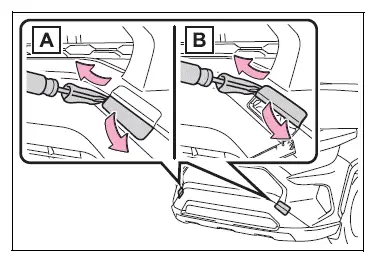
Type B
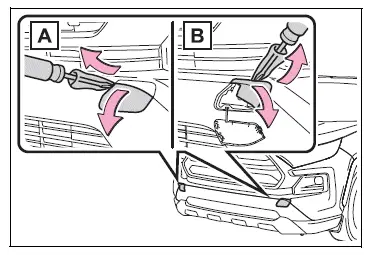
3. Insert the towing eyelet into the hole and tighten partially by hand.
Type A
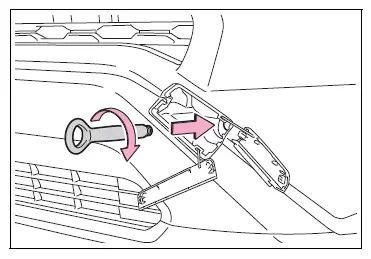
Type B
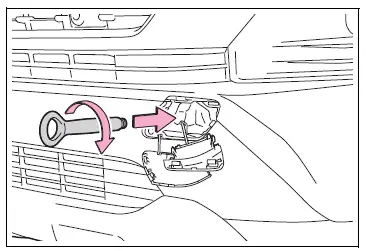
4. Tighten down the towing eyelet securely using a wheel nut wrench or hard metal bar.
Type A
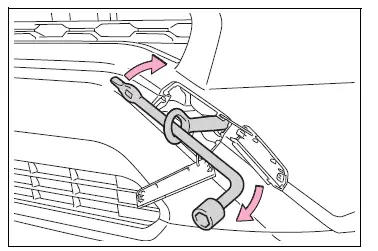
Type B
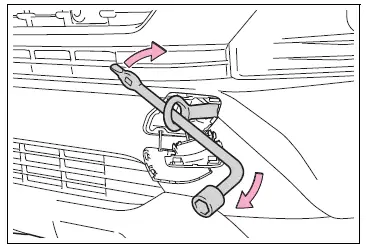
5. Securely attach cables or chains to the towing eyelet.
Take care not to damage the vehicle body.
6. Enter the vehicle being towed and start the engine.
If the engine does not start, turn the engine switch to ON.
Vehicles with Stop & Start system: Before towing the vehicle, turn the engine switch to OFF once, and then start the engine.
7. Shift the shift lever to N and release the parking brake.
Turn automatic mode off.
When the shift lever cannot be shifted.
â– While towing
If the engine is not running, the power assist for the brakes and steering will not function, making steering and braking more difficult.
â– Wheel nut wrench
Wheel nut wrench is installed in the tool bag in luggage compartment.
WARNING
Observe the following precautions.
Failure to do so may result in death or serious injury.
â– While towing
- When towing using cables or
chains, avoid sudden starts, etc.
which place excessive stress on the towing eyelets, cables or chains. The towing eyelets, cables or chains may become damaged, broken debris may hit people, and cause serious damage.
- Vehicles without smart key system:
Do not turn the engine
switch to the "LOCK" position.
There is a possibility that the steering wheel is locked and cannot be operated.
â– Installing towing eyelets to the vehicle
Make sure that towing eyelets are installed securely. If not securely installed, towing eyelets may come loose during towing.
NOTICE
â– To prevent damage to the vehicle during emergency towing
Do not secure cables or chains to the suspension components.
â– When towing the vehicle (vehicles with Stop & Start system)
If it is necessary to tow the vehicle with all four wheels on the ground, perform the following procedure before towing the vehicle, in order to protect the system.
Turn the engine switch to OFF and then start the engine or turn the engine switch to ON.
 If you think something is
wrong
If you think something is
wrong
If you notice any of the following
symptoms, your
vehicle probably needs
adjustment or repair. Contact
your Toyota dealer as
soon as possible.
Visible symptoms
Fluid leaks under the vehicle
(Water ...
Other materials:
Front wiper rubber
Components
Removal
Remove front wiper blade
Detach the claw as shown in the illustration.
Remove the wiper blade as shown in the illustration.
Notice:
Do not fold the wiper arm with the wiper blade
removed. The arm tip may damage the
windshield surface.
Rem ...
Installation
Hint:
Use the same procedures for the rh side and lh side.
The procedures listed below are for the lh side.
Install rear door belt moulding assembly
lh
Attach the claws to install the moulding.
Hint:
Confirm that the moulding is firmly installed.
Install rear door tr ...
How to proceed with troubleshooting
Hint:
Use these procedures to troubleshoot the engine immobiliser
system.
*: Use the intelligent tester.
Vehicle brought to workshop
Inspect battery voltage
Standard voltage:
11 to 14 v
If the voltage is below 11 v, recharge or replace the battery
before proceeding.
cran ...

